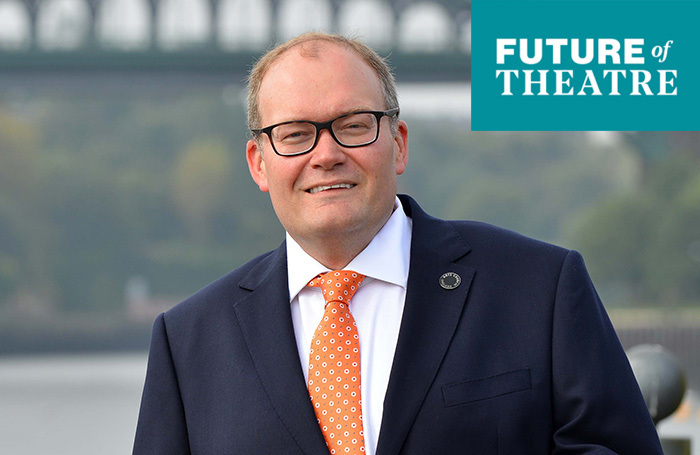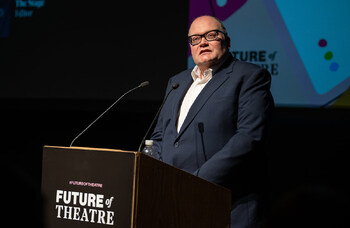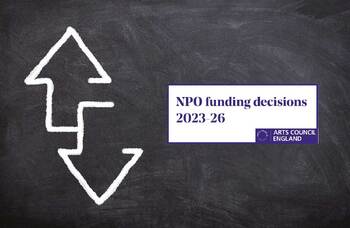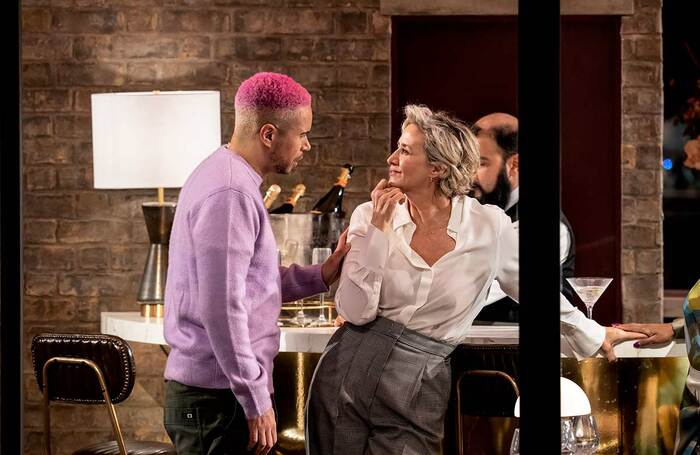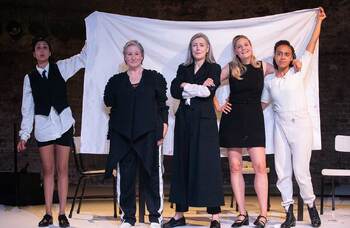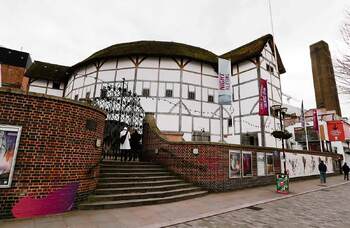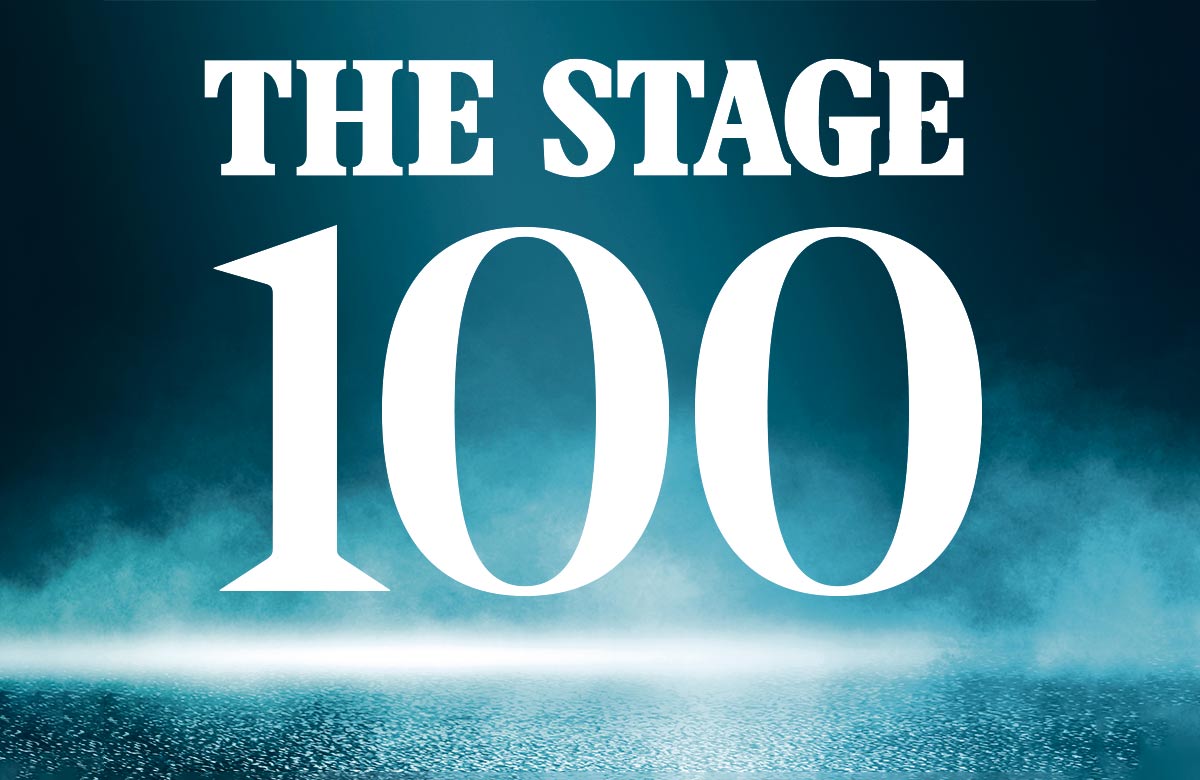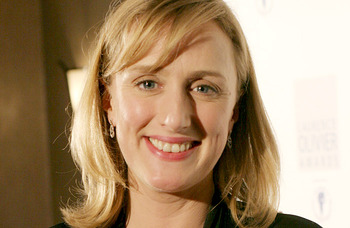Darren Henley: 'I will always be greedy, and make the case, for more investment in culture'
Giving the opening keynote address at The Stage’s Future of Theatre conference on March 29, Arts Council England chief executive Darren Henley spoke about the changes the funding body is making in its latest portfolio and why he believes they are necessary for the sector’s future. Here is his speech in full...
One of the great things about my job is that I get to witness the innovation and excellence of our creative people and cultural organisations every day. Recently, I went to see the Rambert Dance production Peaky Blinders: The Redemption of Thomas Shelby.
It brings to life – in a new way – the story and characters familiar to millions who adored the small-screen version. At the interval, I was chatting with those sitting on either side of me in Bradford’s Alhambra Theatre. One couple were avid fans of the telly drama, but they hadn’t seen a dance production in the theatre before. For those on my other side, the opposite was true – they loved dance theatre but had never seen the TV series. But, like me, both couples were loving the spectacle unfolding on stage before them.
That interaction of audience and exciting work is, of course, what we all want to see. In the present environment, I do not – for one minute – take it for granted that this is easy to achieve. A few days from now, the Arts Council will welcome its new national portfolio, informed by our strategy Let’s Create. It’ll be in place for the next three years. It’s an important moment.
We’ll see the largest number of theatres, arts organisations, museums and libraries join our national portfolio ever, with almost 1,000 organisations receiving regular funding. Of those, more than a quarter will be supported for the first time. Many are in places that have never had an organisation regularly funded by us before. Our total investment will rise to £446 million a year – compared to the £408 million we invested annually during the last portfolio. It’ll bring new creative and cultural life to new places and to new people across England.
I’m highlighting these facts because, in the noise about the popular and unpopular specific decisions, the bigger picture can become overshadowed. It’s of course right that the Arts Council is held to account. And it’s inevitable that what we don’t fund attracts more scrutiny than what we do.
But if we reduce the overall picture to focus only on a few organisations, if we make that debate ’either/or’ about access or excellence as if they exist only in opposition, and if we start to argue for one art form at the expense of another, then there’s a danger that our perspective becomes too narrow and too short term, focusing on individual elements, but failing to see the big picture.
ACE’s strategy is about stewardship, for here and now, and for the future
That picture is more complex. It’s an entire cultural ecosystem and its interdependencies. As the development agency for creativity and culture, we need to take a broader view. Our strategy, Let’s Create, is not singularly focused. It’s about balance – and rebalancing. It’s about stewardship, for here and now, and for the future. We recognise the complexity of the environment in which we invest, with each part of the theatre industry – commercial, subsidised and not-for-profit sectors – reliant and working interdependently with the other.
We do not think in categorical terms. We are not an either/or organisation. Rather, I see us as an ’and/and’ organisation.
So, we’re here for the regular audience members who loyally support their local theatre month-in-month-out, and we’re here for that couple in Bradford who’ve not been to the ballet before. We’re here for every art form – theatre, music, dance, literature, the visual arts. We’re here for everything within and between those forms – opera, musical theatre, jazz, circus, carnival and more. We’re here for museums. We’re here for libraries. We’re here for arts and health, arts and tech, arts and the environment. We’re here for every geography – north, south, east, west – and for big cities, post-industrial towns and small villages.
And the most important and/and of all: we’re here for audiences. Because audiences demand work they can access, and they demand work of the highest quality. The people who pay their taxes and play the National Lottery, it’s their money that we invest, creating a virtuous circle. It enables creative people and creative organisations to innovate, to take to risks, be bold, to go on new creative adventures and to surprise and challenge audiences, participants and visitors. And the more we delight and astound audiences, the more they’re prepared to support the case for more public investment in our arts and culture.
Continues...
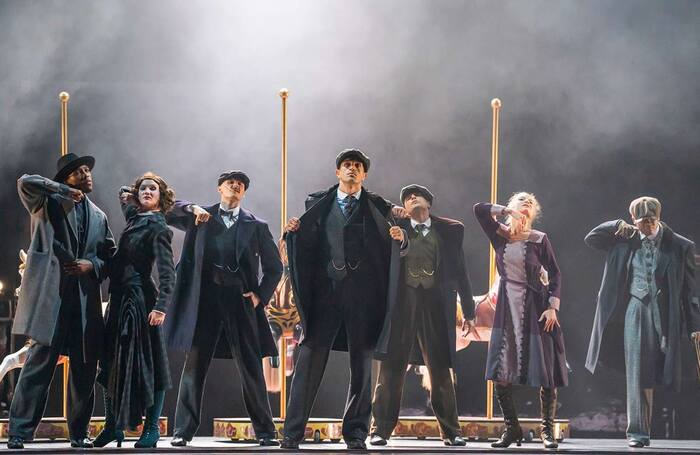
Managing change
One of the Arts Council’s balancing acts is the need to consider the health of the sector at this moment in time – and to sustain its long-term viability into the future. I really do understand how challenging some of our decisions have been for people working in organisations we’ve previously funded. And in no way do I minimise the shock and uncertainty they face.
We’re playing our part to make sure change is managed as compassionately and as fairly as possible. This includes £10.5 million of Transition funding programme for organisations leaving our portfolio and £8.6 million of Transform programme investment for organisations where we’ve reduced funding and business models need rethinking. To take just one example, we’ll be offering Welsh National Opera £3.25 million in addition to its annual NPO settlement we announced back in November to help it adapt.
Like all good performance pieces – including the Peaky Blinders production – Let’s Create was a collaborative work. We listened to the public. We engaged with arts organisations, theatres, museums and libraries. We took account of debate in academia and publications such as The Stage.
And this NPO investment is about delivering on Let’s Create: making sure the creative talent of every person can flourish, giving people the chance to experience amazing culture in more places, and making sure that England’s cultural sector is innovative, inclusive, collaborative and world-renowned.
Although Let’s Create was devised before the pandemic, its ideas are grounded in the need for change and the ability to adapt. Based on knowledge, understanding and experience of the past, I believe that we together created a forward-looking document that’s highly relevant to our uncertain environment. I believe it’s informed a portfolio of almost 1,000 organisations that can respond with courage and imagination to that uncertainty.
But, what does this round of NPO investment mean more specifically for the future of theatre? Let’s start with the data.
It means theatres and theatre companies will receive more money than any other art form: £111.9 million a year. That’s a rise of around £9 million a year on what we currently invest. It means 196 theatres and theatre companies in our new national portfolio. Forty-eight of them are new joiners.
It means funding 279 touring organisations that work not only in theatre but in other art forms and disciplines too – a total investment of almost £198 million a year – bringing high-quality creative activities and cultural experiences to our villages, towns and cities. But it’s not just a list of facts.
Our new portfolio means delivering the ambition of Let’s Create too: engaging the young, presenting more theatre to more people in new ways and embracing the idea that innovation, ambition and access are not in opposition to each other – but rather feed each other.
Our decisions will mean more children and young people will have the chance to see theatre closer to where they live, to work with theatremakers to tell their own stories and to have their talent nurtured, shaping a new generation of theatre audiences and theatremakers. That’s reflected in our funding of organisations such as Mortal Fools in Northumberland. It co-creates theatre with thousands of young people every year. And Zest Theatre in Lincoln: it gives young people a voice through work in theatre, festivals, public spaces, schools and digital spaces.
Our decisions will mean more theatre taken to more people in more ways
Our decisions will mean more theatre taken to more people in more ways. Thirty-six of the theatre companies and theatres we support will be places where, historically, our investment has been too low. This includes North Devon Theatres, which runs the Queen’s Theatre in Barnstaple and the Landmark in Ilfracombe, and its sister theatres in Peterborough – the Key Theatre and the New Theatre. It includes our investment in Knowsley in the Shakespeare North Playhouse. It includes the Old Courts in Wigan and Queen’s Theatre in Hornchurch.
It means more touring, through 82 new national portfolio organisations. These include Northern Lines and Ad Infinitum – both known for attracting and developing new audiences through the use of innovative form and content. And, we’ve increased our investment in the National Rural Touring Forum to reach previously underserved places. Our decisions will mean we have a performance ecosystem in which different ways of making and presenting theatre at all scales are valued and celebrated. It means investing in iconic names, recognisable across the globe, such as the Royal Shakespeare Company, where I loved seeing The Tempest a few weeks back, or the stunning reinterpretation of Phaedra at the National Theatre just a few days ago.
It means investing in theatres with outstanding reputations for producing and presenting new work in places from Liverpool to Sheffield, Ipswich to Plymouth, and many in between. And – an act of balancing about which we thought, and worried, long and hard – maintaining enough investment in London to support theatre ready for national and international stages.
It also means nurturing and investing in theatres and theatremakers who champion established and new voices in the rest of the country like the really exciting work I’ve seen as I’ve travelled around the country in the weeks since we announced our investment programme. Plays such as Rob Ward’s Love It If We Beat Them – about football, love and politics – at Live Theatre in Newcastle.
On the same day in Newcastle, at Northern Stage, I also caught Kin, by Ipswich-based Gecko, which looks at the themes of migration, belonging and home. In Coventry, I saw the theatrical adaptation of Manjeet Mann’s novel Run, Rebel. It’s a co-production between the Belgrade in Coventry, Pilot Theatre, York Theatre Royal, Mercury Theatre in Colchester and Derby Theatre. Just a couple of days ago, at Liverpool’s Royal Court, I saw Cosmic – the debut play by Joe McNally, who learned his craft at the theatre’s Playwright Development Programme. And I loved Maxine Peake and Seiriol Davies’ Betty! A Sort of Musical at the Royal Exchange in Manchester, just as I loved Ballet Black’s Nina: By Whatever Means, part of a double bill that premiered at the Barbican a couple of weeks ago.
Continues...
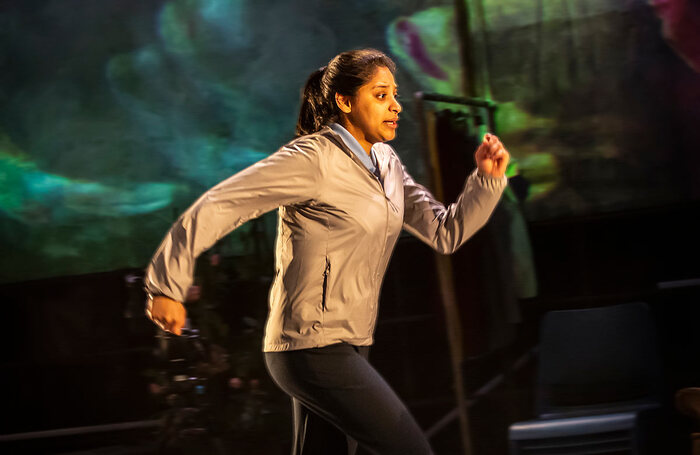
Support and innovation during unprecedented times
I’m full of hope for what our latest investment, rooted in the principles of Let’s Create, will achieve. I’m also acutely aware that there’s nervousness and fatigue among all those we support – including in theatre and the performing arts.
The pandemic had a huge impact on our sector. It led to innovation and experimentation in how to engage with audiences. It showed the creativity, adaptability, and resilience of all those who work in our world. We made the case, along with sector bodies, unions and networks, for supporting the sector through those unprecedented times. The government’s response was unprecedented too.
The investment through the Culture Recovery Fund helped our sector survive the immediate threat that Covid-19 posed. But the aftershocks of the pandemic are still being felt. The Association of Leading Visitor Attractions has recently confirmed that visitor numbers, particularly those from overseas, have not recovered to pre-pandemic levels, while the Audience Agency’s research shows attendance at live events might be less frequent than it was before the pandemic.
I am pleased that we, alongside sector organisations such as the Society of London Theatre and UK Theatre, were able to provide valuable evidence to the government to support them in its recent decision to extend the theatre, orchestra, and museum-and-galleries tax relief for a further two years. Our analysis suggests this will mean at least an additional £80 million of income across the next two years for our funded footprint, and an estimated £350 million for the wider sector through to 2026. It’ll support jobs, innovation and new work and, in turn, will support the economies of our villages, towns and cities.
It’s a positive indication that chancellor Jeremy Hunt and our new culture secretary Lucy Frazer recognise the important role the creative and cultural sector plays in our national life.
Uncertainty remains, though.
You tell us that life as a freelancer is even more precarious than usual right now. You tell us you are worried about the skills drain that has led to shortages of staff. You’re worried about audiences who haven’t returned to the levels you would like – and what that means for income and cash flow. You’re worried about the future of touring, particularly at the mid and large scale. You’re worried about the impact of the cost of living on just what you can achieve. You tell us you are worried about pressures on public funding from us and from local authorities, and that you are tired and weighed down by all these worries.
We understand why you’re feeling that way. We understand you need to balance innovation and survival. The continuation of the tax relief will help, but we know that some of you are feeling more cautious. You’re looking at consolidating what you do. It’s understandable.
What I would say to you is that we’re listening, we hear you and we’ll work with you to deal with those challenges. So, what’s the Arts Council doing to help make sure theatre – and the sector as a whole – comes out of these uncertain times, fit for the future?
One thing I want to keep reminding you is that we’re taking the pressure off organisations in our new portfolio to feel they have to deliver exactly at the level of ambition they stated when they first applied to this round. We know things have changed since we launched the application process, and that the investment we provide won’t necessarily go as far as you’d hoped.
Our funding agreements recognise the limitations of organisations in these pressured times
We want to reassure NPOs that your focus should be on doing as much as you can in the circumstances – and on doing it really well. We accept this may mean less risk-taking in the short-term. Our funding agreements for the new portfolio recognise the limitations of organisations in these pressured times. But there are other ways we can support you, too.
One way is by developing opportunities to explore new ways of working and showcasing new artistic talent. That can be seen in our £3 million investment in two pilot Producing Hubs in Bradford and in Derby. These collaborations are successfully testing new approaches to producing, presenting and touring a wide range of theatre and performance. They’re supporting the development of new talent and bringing in new audiences.
It’s also reflected in our support for showcasing talent on an international stage. We’ve invested £2.25 million in the Horizon Showcase to connect artists with international promoters and networks. From this, there have already been tours – or plans for touring – in Australia, Canada, the USA, Mexico and more. We’re in the planning stage to create further versions of Horizon in the future.
We’re also supporting the return and growth of audiences in the wake of the pandemic. One way we’re doing that is through Illuminate – our new audience data platform. It’ll give our funded organisations access to meaningful insights about who engages with their activities.
Another way is through a partnership with the arts councils in Wales and Northern Ireland, with Creative Scotland and with the BFI, to create a nationwide access scheme for disabled, D/deaf and neurodivergent people. We’ll share more with you on this later in the summer.
We’re also looking at what more we can do to support organisations and individuals with practical and useful development tools, and by adapting our funding programmes. We shape this work by listening to you and tuning in to your needs.
Continues...
An eye on the future
Later this spring, we’ll be launching our Transforming Governance programme. It’ll offer workshops, mentoring and specialist advice to creative and cultural organisations looking for help in how to improve their oversight. This programme itself has an ’eye on the future’ as it’s open not only to those that we currently support but also to those hoping to be a part of our next national portfolio.
We’re reviewing how we can better support touring. Our National Lottery Project Grants programme was relaunched in 2021 with £12 million a year earmarked to support touring. Although some parts of the ecology, such as small-scale and rural activity, are in reasonable health, we know challenges exist elsewhere, particularly around who will bear the risk of new mid-scale and large-scale tours. That’s why we’re looking again at the design of that ring-fenced funding. We’re listening to what different stakeholders have to say. And that will help shape plans to support renewed confidence in this vital part of the theatre ecosystem.
We’re also looking at how our National Lottery Programme grants can work better for individual applicants. It’s part of work we are doing to provide more support for freelancers. Recognising that they’re the vital talent, the key source of creativity, inspiration and drive upon which the performing arts depend for their success, we’ve also increased the amount of money for which individuals can apply through our Developing Your Creative Practice funding programme. I am also pleased to tell you that in addition to these projects, we’ll be launching a new round of our Capital Investment Programme. It’ll have a total budget of £20 million for this coming financial year from April. It’ll provide grants of up to £750,000 for successful applicants to help them operate safely in the wake of the pandemic, improving access, supporting technical innovation and working in more environmentally responsible ways. And, for our part, we will continue to advocate for increased investment in publicly funded theatre and performance arts with the government. I know the pressure on funding is a huge concern to our sector. I will always be greedy for more investment in culture. I will never hesitate to make the case because I know how much good work could be funded and the positive impact it has on people’s lives.
I will never hesitate to make the case for more funding because I know how much good work could be funded and the positive impact it has on people’s lives
The chancellor has talked about growing the economy. The theatre and performing arts already contribute a great deal to our nation’s economic well-being. Our latest published figures, prepared for us by the Centre for Economic and Business Research, show the gross-added-value of the performing arts to the economy was almost £2.4 billion.
But we also know that the benefits go much deeper than economic contribution. In fact, it’s not even the half of it – bringing the world’s greatest stories to stages, being a source of connection and pride in communities, multiplying happiness and making meaning are things that can’t be measured by GVA. With you, we want to work to show the incredible offer our sector makes to the public and how that can justify an ask on the public purse that will enable you to be the best you can be for your audiences and communities.
I mentioned earlier the new adaptation of Phaedra that I’d seen at the National. It’s subtitled “a new play by Simon Stone, after Euripides, Seneca and Racine”. It’s a play that, through the thousands of years it’s been staged, has witnessed theatre’s ability to survive economic slowdowns, pandemics and even the fall of the Roman Empire. And it has witnessed theatre’s ability to embrace innovation from the early adoption of electric lighting to making full use of the opportunities the latest digital technology has to offer.
The future of theatre and the performing arts lies in a willingness to embrace the new, the bold and the innovative. That is your superpower.
It will enable you to do more than survive – to move forward and flourish – and surely grow, even when the future seems uncertain. I believe the investments we’ve made and the decisions we’ve taken will help theatre, the performing arts and the wider creative and cultural sector to do just that.
And, as we face the future together, I want to finish by saying thank you. Thank you for all that you do for audiences, for places, for people whose stories need to be told and to be heard. Thank you for continuing to innovate, to question, to imagine.
At the Arts Council, we’ll continue to be here to make the case, to make the investments and, above all, to back your ambition, to defy expectation, to dare, to dazzle and to delight the audiences of the future.
For more information about the Future of Theatre conference and to buy on-demand tickets to the event, visit: thestage.co.uk/events/future-of-theatre-conference
Opinion
Recommended for you
Opinion
Recommended for you
Most Read
Across The Stage this weekYour subscription helps ensure our journalism can continue
Invest in The Stage today with a subscription starting at just £7.99
